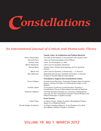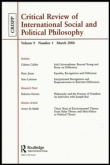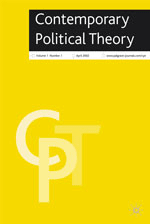
Constellations-An International Journal of Critical and Democratic Theory
Scope & Guideline
Exploring the Nexus of Theory and Democratic Practice
Introduction
Aims and Scopes
- Critical Democratic Theory:
The journal emphasizes the analysis and development of democratic theory, exploring various models and practices of democracy, including participatory, radical, and deliberative approaches. - Interdisciplinary Approaches:
It encourages interdisciplinary perspectives, integrating insights from sociology, philosophy, political science, and cultural studies to enrich discussions on democracy and critical theory. - Focus on Ideology and Power:
The journal critically examines the role of ideology in shaping social and political realities, addressing themes such as populism, authoritarianism, and neoliberalism. - Global Justice and Ethics:
There is a consistent focus on global justice issues, exploring ethical dimensions of political theory in relation to migration, identity, and systemic inequalities. - Historical Contextualization:
Many articles contextualize contemporary issues within historical frameworks, drawing on the legacies of critical theorists and movements to inform present-day discussions. - Community and Identity Politics:
The journal explores issues of community, identity, and belonging, analyzing how these factors influence democratic engagement and political representation.
Trending and Emerging
- Decolonial Perspectives:
There is a growing emphasis on decolonial theories and practices, exploring how colonial histories impact contemporary political structures and identities. - Technological Impact on Democracy:
The intersection of technology and democracy is increasingly examined, particularly how digital platforms reshape public discourse, participatory practices, and accountability. - Environmental Justice:
Emerging discussions focus on the relationship between democracy and ecological crises, highlighting how environmental concerns intersect with social justice and political action. - Critical Race Theory:
There is a noticeable increase in the engagement with critical race theory, addressing systemic racism and its implications for democratic practices and social justice. - Populism and Authoritarianism:
The rise of populist movements and authoritarian governance continues to be a significant theme, with analyses of their impacts on democratic institutions and civil society. - Mental Health and Politics:
Emerging themes also include the psychological dimensions of political engagement, exploring how mental health intersects with activism, democracy, and social movements.
Declining or Waning
- Traditional Liberalism:
Discussions centered on classical liberalism and its foundational principles have become less prominent, as contemporary debates increasingly focus on critiques of liberalism and the rise of alternative political frameworks. - Historical Case Studies:
While historical contextualization remains important, the specific focus on singular historical case studies has waned, possibly in favor of broader theoretical explorations and contemporary relevance. - Static Political Models:
The reliance on static models of political theory and democracy has decreased, as the journal increasingly emphasizes fluid and dynamic understandings of political engagement and representation. - Universalist Perspectives:
There appears to be a decline in universalist approaches to democracy, as more recent publications prioritize localized and contextual analyses of political phenomena. - Theoretical Purism:
There seems to be a waning interest in purist theoretical stances, with scholars opting for more eclectic and integrative approaches that draw from multiple schools of thought.
Similar Journals

Politics Philosophy & Economics
Advancing Scholarly Dialogue Across DisciplinesPolitics, Philosophy & Economics, published by SAGE Publications Inc, is a leading interdisciplinary journal that spans the critical domains of politics, philosophy, and economics. With a strong commitment to fostering scholarly dialogue, this journal caters to researchers and practitioners by addressing both theoretical queries and practical implications within the social sciences. Established in 2002, it has garnered a notable reputation, currently holding a Q2 quartile ranking in Economics and Econometrics, and Q1 rankings in both Philosophy and Sociology and Political Science. With impactful publications, this journal continues to play a pivotal role in shaping contemporary debates and fostering empirical inquiry, making it an essential resource for academics and students alike. Notably, it has received significant acclaim in Scopus rankings, offering a robust platform for scholarly exchange.

Revista Internacional de Pensamiento Politico
Fostering Innovation in Political DiscourseRevista Internacional de Pensamiento Politico is a prestigious academic journal dedicated to the interdisciplinary exploration of political thought and theory, published by UNIV PABLO OLAVIDE in Seville, Spain. With its commitment to Open Access since 2006, the journal ensures that cutting-edge research is accessible to a global audience, fostering scholarly dialogue and innovation in the field of political science. Given the increasing relevance of political discourse in today's complex world, this journal serves as a vital platform for researchers, professionals, and students interested in contemporary and historical political ideas. While the journal is still building its H-index and Scopus ranking, it is rapidly gaining recognition for contributions that advance understanding of political dynamics, institutions, and ideologies. By bridging various theoretical approaches and engaging with diverse perspectives, Revista Internacional de Pensamiento Politico aims to enhance academic discourse and policy development in the realm of political studies.

Res Publica-Revista de Filosofia Politica
Navigating the Intersection of Politics and PhilosophyRes Publica-Revista de Filosofia Politica, published by the Universidad Complutense de Madrid, is a distinguished academic journal dedicated to the exploration of political philosophy and its intersection with sociopolitical frameworks. With an ISSN of 1576-4184 and an E-ISSN of 1989-6115, this journal serves as a crucial platform for the dissemination of scholarly research and discussions that engage with contemporary political issues and philosophical inquiries. The journal has achieved notable standings, ranked Q2 in Philosophy and Q3 in Sociology and Political Science for 2023, reflecting its impact and relevance in these fields. Covering converged years from 2019 to 2024, it provides accessible content through a commitment to rigor and scholarly excellence, making it an essential resource for researchers, professionals, and students who seek to advance their understanding of complex political dynamics. The journal's international scope is underscored by its proactive engagement with global political theories, enriching the academic discourse surrounding philosophy and political science.

Journal of Social Philosophy
Exploring the Depths of Ethical DiscourseJournal of Social Philosophy, published by Wiley, is a premier academic resource in the field of philosophy, specifically focused on social theory and ethics. With an esteemed impact factor indicative of its scholarly influence, this journal consistently ranks in the Q1 category of philosophy journals, placing it among the top 12% of publications in its field according to Scopus. Spanning a convergence of intellectual inquiry since its establishment in 1970, the journal serves as a vital platform for researchers, professionals, and students to engage with groundbreaking discussions and contemporary debates relevant to social philosophy. Although it does not offer an open-access model, the journal is accessible through various academic institutions globally, ensuring that its rich content reaches an informed audience eager for rigorous philosophical exploration. With headquarters located in the United Kingdom, the Journal of Social Philosophy continues to shape the discourse on social practices, ethics, and political theory well into 2024 and beyond.

Critical Review of International Social and Political Philosophy
Illuminating Theories that Shape Our WorldThe Critical Review of International Social and Political Philosophy, published by ROUTLEDGE JOURNALS, TAYLOR & FRANCIS LTD, stands as a pivotal platform in the realms of philosophy, sociology, and political science. With an impressive Q1 ranking in Philosophy and a Q2 ranking in the Social Sciences sector for 2023, the journal is uniquely positioned to explore and critique contemporary issues through a philosophical lens. Although it does not currently offer Open Access, its esteemed reputation is evident in its Scopus rankings: 136th in Arts and Humanities and 610th in Social Sciences, reflecting its substantial impact in these fields. Covering a broad spectrum of topics, the journal invites contributions that delve into theoretical explorations and empirical studies, aiming to foster critical discussions that resonate in today’s sociopolitical landscape. Published in the United Kingdom, the journal continues to serve as an essential resource for researchers, professionals, and students seeking to deepen their understanding of social and political thought.

Democratic Theory-An Interdisciplinary Journal
Challenging Norms and Expanding Horizons in Democratic TheoryDemocratic Theory-An Interdisciplinary Journal, published by BERGHAHN JOURNALS, is a leading scholarly platform dedicated to the exploration and discourse of democratic ideals across various disciplines. With its roots dating back to 2014 and transitioning to open access in 2021, the journal encourages a diverse range of perspectives in the realms of philosophy, sociology, and political science. Recognized for its rigorous peer-reviewed content, it boasts impressive rankings, including a Q1 classification in Philosophy and a Q2 classification in Sociology and Political Science, indicating its significant impact on current academic discourse. The journal’s commitment to fostering interdisciplinary dialogue is evident through its broad scope, enabling researchers and professionals to engage with innovative ideas and critical analyses of democratic practices. With an address in the vibrant intellectual hub of Brooklyn, NY, Democratic Theory serves as a crucial resource for scholars, students, and practitioners seeking to deepen their understanding of the complexities surrounding democracy today.

Tocqueville Review
Unraveling the Complexities of Democratic SocietiesThe Tocqueville Review, published by University of Toronto Press Inc., is a critical academic journal dedicated to the fields of history, sociology, and political science. With its ISSN 0730-479X and E-ISSN 1918-6649, this journal serves as an essential platform for scholars seeking to explore the interplay between democracy and social theory through a Tocquevillian lens. Recognized with a 2023 ranking of Q3 in History and Q4 in Sociology and Political Science, it offers nuanced insights that resonate in contemporary discourse, making it highly relevant for researchers, professionals, and students alike. Spanning publication years from 2009 to 2024, the journal invites contributions that reflect diverse perspectives and innovative methodologies. Although not an open-access journal, its compelling articles are essential for those advancing critical thought in the social sciences. By fostering a robust academic dialogue, The Tocqueville Review aims to illuminate the complexities of democratic societies and their historical underpinnings, thus securing its position as an indispensable resource within its academic domains.

STUDIES IN PHILOSOPHY AND EDUCATION
Fostering Innovative Ideas for a Brighter Educational FutureSTUDIES IN PHILOSOPHY AND EDUCATION, a reputable journal published by Springer, is nestled in the dynamic intersection of philosophical inquiry and educational theory. With an ISSN of 0039-3746 and an E-ISSN of 1573-191X, this journal has been a significant platform for scholarly discourse since its inception in 1960. Located in the Netherlands, its impressive standing is reflected in its 2023 Scopus rankings, positioned in the Q1 category for Philosophy and Q2 in Education, alongside a commendable 90th percentile in the field of Arts and Humanities. Dedicated to fostering innovative thought and contributing to the evolving landscape of education and philosophy, the journal encourages submissions that explore diverse theoretical frameworks and practical applications. Although not an open-access publication, it remains an essential resource for academics, educators, and researchers aiming to deepen their understanding of the philosophical underpinnings of education. Engage with cutting-edge research and critical analyses that shape the future of educational practices and philosophical thought.

Contemporary Political Theory
Advancing the Frontiers of Political ThoughtContemporary Political Theory, published by Palgrave Macmillan Ltd, stands as a leading journal in the field of Political Science and International Relations, as well as Sociology. With an impressive impact factor and a solid position within the top quartiles (Q1) of its categories based on the 2023 rankings, this journal is dedicated to advancing scholarly debates and providing innovative insights into political theory. With an enriching scope that spans from 2009 to 2024, it publishes peer-reviewed articles that explore contemporary political dynamics, theoretical frameworks, and interdisciplinary perspectives. Aimed at researchers, professionals, and students alike, the journal invites contributions that challenge conventional wisdom and foster critical discourse in a rapidly evolving global landscape. Access options are available through various academic platforms, making this journal an essential resource for anyone invested in understanding the complexities of modern political thought and practice.

CRITIQUE
To Illuminate, Critique, and Transform.CRITIQUE is a prominent French academic journal published by EDITIONS MINUIT, specializing in the fields of cultural studies, history, and literary theory. Since its inception, CRITIQUE has provided a critical platform for scholarly discourse, aiming to challenge conventional perspectives and foster innovative thought within the humanities. While it operates under a traditional subscription model, its commitment to intellectual rigor positions it as a valuable resource for researchers, students, and professionals alike. With a focus on interdisciplinary approaches and critical methodologies, CRITIQUE holds its place among the esteemed ranks of cultural studies and literary publications, currently rated in Q4 across various categories by Scopus. As it converges through the years from 2015 to 2024, the journal continues to facilitate discussions that interrogate historical narratives and their cultural contexts, making it an essential read for anyone invested in the developments of contemporary thought in the humanities.